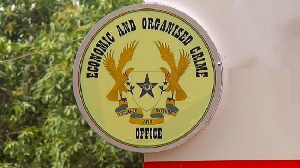Tema, May 12, GNA - Workers of the Ghana National Petroleum Corporation (GNPC), on Wednesday pledged their commitment to ensure that Ghanaians derived the maximum benefit from the operations of the Corporation.
They pointed out that as a national corporation, GNPC's fortunes w= ere tied to the success of the country and its people and it would, therefore= , not renege on its responsibility to respond in a prompt and cost effectiv= e manner to the needs of the country at any time.
At a press conference in Tema in reaction to allegations made agai= nst GNPC by workers of the Tema Oil Refinery (TOR), the GNPC workers stated t= hat over the past few months, there has been a calculated attempt by TOR to blame GNPC for the problems the Refinery was facing. The Principal Human Resource and Administrative Officer of GNPC, M= r Edward Appiah-Brafoh, who read the press statement, recounted that on Apr= il 13, this year, workers of TOR led by their Union at a press conference catalogued allegations against GNPC. Among the allegations, which were repeated during a peaceful demonstration on May 11 2010, TOR asked GNPC to stick to its mandate to f= ind oil and alleged that the Corporation had hijacked the Refinery's responsibility of importing crude oil. While blaming GNPC for not paying fair processing fees, TOR also alleged that the Corporation had imposed a tolling agreement on the Refinery. Additionally, TOR accused GNPC for its inability to provide the Refinery with adequate crude oil supplies; and queried whether the Corporation had mandated the Bulk Oil Storage and Transportation (BOST) t= o sell petroleum products on its behalf.
Also, TOR asked whether any individual at GNPC or any top governmen= t official was benefiting from crude oil transactions. Responding to these allegations, Mr Appiah-Brafoh explained that GN= PC's mandate was not restricted to finding oil, adding that the Corporation ha= d been involved in crude oil trading since its inception in 1985. He stated that since its formation in the 1960s when it was known a= s GHAIP and until April 1998, TOR operated as a processing plant on a tolli= ng basis.
Mr Appiah-Brafoh recounted that PNDC Law 64, 1983, which establishe= d the GNPC, gave the Corporation the mandate to import crude oil, among oth= er functions adding that that same law did not restrict GNPC from exploratio= n. He said in addition to GNPC's legal mandate, the Corporation was specifically appointed by government during the latter part of 2009 to resume the management of the importation of crude oil on its behalf. "The decision to import crude oil for refining at TOR, was therefor= e not a decision by the GNPC. It was one by government in the national interest to ensure cost-effective management of this function," Mr Appiah-Brafoh. On the issue of GNPC "hijacking" TOR's responsibility to import cru= de oil, Mr Appiah-Brafoh made it clear that far from that the Corporation wa= s not in any way preventing the Refinery from operating freely. He said it was worthy to note that in spite of several attempts by=
TOR to buy its own crude oil, the Refinery had been unsuccessful simply because of its inability to secure letters of credit.
The issue, he said, was therefore financing and not crude oil availability. Touching on the allegation that GNPC was dictating how much to pay=
TOR for refining crude, Mr Appiah-Brafoh dismissed it as false, and explained that the current processing fee of 32.5 dollars per metric tonn= e, was agreed upon after a protracted negotiation between the two institutio= ns. In this way, he said, the processing fee was neither imposed by th= e government nor GNPC.
He said on the imposition of tolling arrangements on TOR, the work= ers of GNPC stated emphatically that there had not been any such imposition. Again on the accusation of insufficient crude oil supplied by GNPC,= he said it was a disingenuous allegation because in the workers view, it was=
due to the constant shut down of the Refinery-notably between mid-January=
and mid-March this year.
Mr Appiah-Brafoh recounted that on January 12 this year, the wet ga= s compressor of the residual fluid catalytic cracking unit, broke down; and=
only a week later, the loading rack was unfortunately gutted by fire resulting in the crude distillation unit being shut down. He recalled also that the processing plants only resumed production= in the second week of March this year, adding that since December last year,=
GNPC had delivered a total of 2,931,861 barrels of crude oil to TOR. The figure, he said, represented an average of 977,287 barrels per month for the months that the processing facilities at the Refinery were not shut down, and were ready to receive crude oil. On the issue of whether or not GNPC had mandated BOST to sell produ= cts on its behalf, Mr Appiah-Brafoh said GNPC had not done so.
He said bearing in mind the impact on Ghanaians the Corporation wou= ld exercise the best judgment in determining the relevant institutions that it should partner with for bulk selling of refined products in order to achi= eve the best benefit to Ghanaians.
Mr Appiah-Brafoh urged workers of TOR to co-operate with their GNPC=
counterparts "for the benefit of the nation, and not allow Ghana's oil sector to be at the mercy of foreign interests or the selfish interests o= f a few." At the press conference, the GNPC workers carried placards on which=
bear inscriptions such as: "TOR Workers-Come and let us reason together i= n Ghana's interest;" "TOR workers beware of private interests;" "GNPC- work= ing to benefit Ghanaians;" "TOR and GNPC -set up to work together in Ghana's interest. 13 May 10
General News of Wednesday, 12 May 2010
Source: GNA












